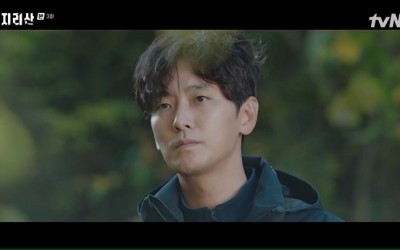Review Dr. Brain: Episode 1
Right off the bat, the first thing I need to say – and perhaps the most important thing about this drama — is that the direction is just fantastic. It’s gorgeous to watch, executed perfectly, and is quite arresting. On everything else, I’m torn. I love the premise and the deep dive into mind-bending possibilities, but at the same time, the story leaves me cold. Perhaps that’s because the drama is much more concerned with the trippy structure of the story, and how our main character gets hit with unexpected events, than building an emotional connection to him as a character.
Dr. Brain has only a six-episode run, so after a bit of exposition in the first half of the episode, we do jump rather quickly into what becomes the crux of the story. But first, we meet our hero as a young boy.

Our hero is LEE SE-WON, and he’s clearly different from the other children around him and struggles to relate to anyone (including his devoted mother) socially or emotionally. We see a brief vignette of how this plays out, how his Autism is diagnosed, and how much his mother strives to champion for him. But it’s not until she dies tragically in front of him (cue Truck of Doom) that Se-won and his genius brain are truly looked at.
After the accident, a neurology team examines him, and we learn how Se-won’s hippocampus and amygdala are quite farther apart than would be considered normal; this constitutes both his genius, and his inability to connect with the world. He’s an adorable child, but there is a coldness that radiates off of him — and the direct and almost mathematically perfect way that the scenes are shot lends to this coldness.
In fact, it’s an interesting dilemma for the drama: the coldness of the filmmaking makes the story so much more effective… but it also makes it difficult to react to the story (or even Se-won) emotionally as the audience.

We meet Se-won several decades later, now played by Lee Seon-kyun. Some quick exposition lets us know that he’s just the same as he was as a young boy — bereft of feeling and emotional attachment. He works in a lab where his coworkers respect his intelligence but are also well aware of his quirks and general detachment. Not that he notices.
Se-won seems to live only for his work, and he’s obsessed with the idea of transferring thoughts from one entity to another. He is looking at a future where thoughts can be predicted, collected, and quantified by a computer. Se-won sees this as a great benefit — the thoughts of a person in a coma, for instance, would become known, and humankind wouldn’t need to communicate with words anymore (how terrrifying!).

Interestingly, Se-won isn’t a bachelor-loner like we might expect. He had a young son with his wife JUNG JAE-YI (Lee Yoo-young), and history doth repeat itself. His son was just like him, his wife struggled to nurture her son, and the whole thing ended in unthinkable tragedy. His young son died in a gas explosion, after which his wife went a bit mad, insisting he was still alive, and ending (ostensibly) with her suicide. While looking at Se-won, you can’t tell that this tragedy affected him in the slightest.
When Se-won finally completes his first example of thought-transfer successfully, it’s through a happy accident, and after many failures. Importantly, the brain waves did not transfer from one live mouse to the other. They only transferred when one mouse died. This allowed the brain waves to be transferred to the live mouse.
 |  |
The plot moves fast at this point, and this is where I get a bit caught. I hands-down adore the concept — that plugging other people’s memories into Se-won’s brain starts changing his own reality, whether that means changing his reality, or causing him to feel emotions, or even changing his personality. This is the main construct of the drama, and it’s fantastic. Where I get caught, though, is with Se-won’s no-questions-asked approach to the whole thing.This means exactly what you think it might. Our somewhat-crazy scientist and his assistant HONG NA-MIL (Lee Jae-won) sneak into a morgue to perform the same experimental procedure, trying to transfer the brain waves of a corpse — into Se-won’s own mind. It doesn’t take an even moderately smart person to understand that this could go terribly wrong. And it does. A little flash of a memory is lodged in Se-won’s brain, and after this point, everything starts to go a bit haywire.

I buy that he will gladly and readily experiment on himself, but when his own reality changes in front of him? When one simple question or circumstance leads him not to investigate in the physical world around him, but to immediately go and download the brain waves of yet another corpse? It’s wild. I believe he’s all in, but I also wonder about the actual science of this.
If Se-won and his very reality are changing, how will he be able to tell the changes apart from the reality? How long will he be him, or will he forget that he doesn’t like to drink coffee or is not left-handed? The lack of any control (in the scientific sense or any other, really) is troubling, and as long as it doesn’t interfere too much with the story, it will make for a riveting narrative as it unfolds.

The deeper Se-won gets in his own experiment, the more strange things start to happen — and the less we can actually trust him as a narrator. This is another great thing about the drama, because there’s nothing stronger for a story’s unpredictability than an unreliable narrator whose brain is changing in front of our very eyes.
But above all, it’s the direction of the drama — its strong style and mood — that make the story come to life. There’s also something satisfying about the frequency of straight head-on shots, and overhead shots. It’s all so perfect, from the proportions to use of color, silhouette, and shadow; it creates the perfect backdrop for a reality that gets upended.
Reservations aside, and perhaps a suspension of disbelief in hand, Dr. Brain delivered an intriguing first episode. The premise is ripe for reversals and twists, and the drama is not afraid to deliver them as the tale unfolds.

Other Articles
-

Recap "Wisher" Episode 6
-

Recap "Wisher" Episode 5
-

Recap "Wisher" Episode 4
-

Recap "Wisher" Episode 3
-

Recap "Wisher" Episode 2
-

Recap "Wisher" Episode 1
-

Recap "Star of Ocean" Episode 2
-

Recap "Star of Ocean" Episode 1
-

The Unknown: Legend of Exorcist Zhong Kui Episode 3 Recap
-

The Unknown: Legend of Exorcist Zhong Kui Episode 2 Recap
-

The Unknown: Legend of Exorcist Zhong Kui Episode 1 Recap
-

Recap "Jirisan" Episode 3
Genres
- Accident
- Action
- Adventure
- Alien
- Amnesia
- Ancient legend
- Animals
- Animation
- Arthouse
- Artificial Intelligence
- Award Winning
- Based on a Comic
- Based on True Story
- Betrayal
- Biography
- BL
- Bodyguard
- Bromance
- Business
- Chambara
- Childhood
- Christmas
- Cohabitation
- Cold Man
- Coma
- Comedy
- Concert
- Conglomerate
- Conspiracy
- Contract Relationship
- Corruption
- Crime
- Criminal
- Curse
- Dance
- Deity
- Demon
- Detective
- Disability
- Disaster
- Documentary
- Drama
- Eastern
- Educational
- Entertainment
- Environment
- Erotica
- Espionage
- Exorcism
- Exploitation
- Fairy
- Family
- Fantasy
- Fashion
- Feminism
- Food
- Foreign
- Friendship
- Game Developer
- Gangster
- Geishas
- Gore
- Goryeo Dynasty
- Grudge
- Gumiho
- Harem
- Hidden Identity
- Historical
- Horror
- Hostage
- Human
- Hypnotism
- Idol Drama
- Indie
- Instructional
- Investigation
- Jidai Geki
- Josei
- Kidnapping
- Kung Fu
- Law
- legal
- Lesbian
- LGBTQ+
- life
- Love Triangle
- Mafia
- Magic
- Manga
- Manhua
- Martial Arts
- Mature
- Medical
- melodrama
- Mermaid
- Military
- Miniseries
- Misunderstanding
- Monster
- Murder
- Music
- Musical
- Mystery
- Mythology
- Nature
- Neighbours
- Noir
- Novel
- Omnibus
- One shot
- Parody
- Phobia
- Poison
- police
- political
- Power Struggle
- Prison
- Professional
- Programmer
- psychiatry
- Psychological
- Reality
- Reality Show
- Reality TV
- Rebellion
- Religion
- Remake
- Republic
- Resurrection
- Revenge
- Rich Man
- Robot
- Romance
- RPG
- Rural
- Samurai
- Scholar
- School
- Sci-fi
- Seinen
- Serial Killer
- Short
- Sismance
- Sitcom
- Slapstick
- Slice of Life
- Society
- Soulmates
- Sports
- Supernatural
- Survival
- Suspense
- Swordsman
- Taiga drama
- Teamwork
- Tearjerker
- Teen
- Terrorist
- Thief
- Thriller
- Time Travel
- Tokusatsu
- Tomboy
- Tragedy
- Tragic Past
- Transmigration
- Trauma
- Treason
- Triad
- Underworld
- Unrequited Love
- urban drama
- Vampire
- Variety
- Variety show
- War
- Warrior
- Web Series
- Webtoon
- Werewolf
- Western
- Witch
- Workplace
- Wuxia
- Yakuza
- Yaoi
- Youth
- Yuri
- Zombie

